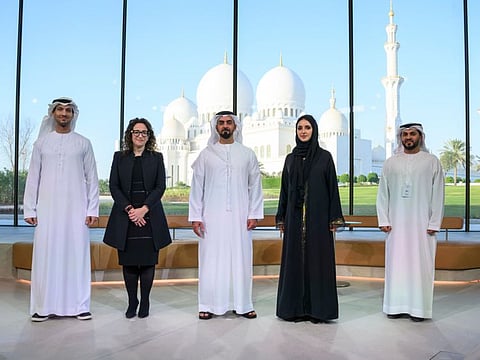Top futurist holds up UAE founding fathers as smartest visionaries in the modern world
Amy Webb urged Emirati community, leadership to continue world-building

Abu Dhabi: The UAE’s founding fathers were some of the modern world’s smartest visionaries and planners, engaging in processes like world-building that many organisations today use to attain growth, a top futurist has said.
Speaking at the first Ramadan lecture at the Majlis Mohamed Bin Zayed, Amy Webb, renowned American futurist and chief executive officer at the Future Today Institute, urged today’s leaders, as well as the Emirati community, to continue these forward-thinking perspectives.
“Effective world-building should result in a vision that compels people, and the vision should result in an emotional response. It turns out you already know some of the smartest visionaries, and the best strategic planners, that have ever lived anywhere on earth, because they are your founding fathers. These leaders engaged in worldbuilding, and imagined a future world that was different from what existed at the time. It was a different approach, and it unified a harmonious society into a future epicentre for business and governing, a place where international languages would be spoken, culture would be inclusive, and with a long-term vision for social projects and economic development. You don’t see anything else like this in the modern world other than what we see here in the UAE,” Webb said.
Game-changing research
She urged the Emirati leadership and community to draw from their forward-thinking strengths, and highlighted the UAE’s advantageous position in terms of facilitating research.
“Of all the places in the world that I can think of, this is a really interesting neutral location for…research [in bioengineering and artificial intelligence],” Webb said while elaborating on examples of bioengineered farms and AI-facilitated banking.
Lecture series
Majlis Mohamed bin Zayed is an ongoing series that aims to address topics relevant to those living in the UAE through conversations with leaders and experts. The 2023 Ramadan lectures will focus on the unprecedented challenges and opportunities amid the evolution of society, culture and technology.
The first lecture was attended by Lieutenant General Sheikh Saif bin Zayed Al Nahyan, UAE Deputy Prime Minister and Minister of the Interior, Sheikh Abdullah bin Zayed Al Nahyan, UAE Minister of Foreign Affairs and International Cooperation, Sheikh Nahyan bin Mubarak Al Nahyan, UAE Minister of Tolerance and Coexistence.
Examples to follow
Webb went on to explain how envisioning a future, while also planning for certainty, helps companies, as well as nations to thrive, using examples like Amazon. She also championed UAE-based examples, including AI and cloud computing company G42, and its subsidiary, the Omics Centre of Excellence.
“I had the opportunity to visit G42, and see some of the phenomenal work that is being done, especially because you have many divisions [considered integral to the future] like space and AI horizontally integrated. This country’s leadership on the genomics project at the Omics Centre is also particularly important because the Middle Eastern population was essentially left out in the genomics databases that existed. You are not benefiting from other human genome project as a result, but I believe you now have half the Emirati population genetically sequenced,” Webb said.
Calling for a people-centre approach to the future, Webb said leaders hold the key to create far-reaching impacts for their people.
“One of the things I really admire about UAE leadership is the government is continuously in prototyping mode, and always talking about a new approach. As you build your future, use perspective on worldbuilding, incorporate emerging technologies even when it challenges your cherished beliefs, and create scenarios to explore uncertainty. And do not wait to get to action,” she advised.
Sign up for the Daily Briefing
Get the latest news and updates straight to your inbox


